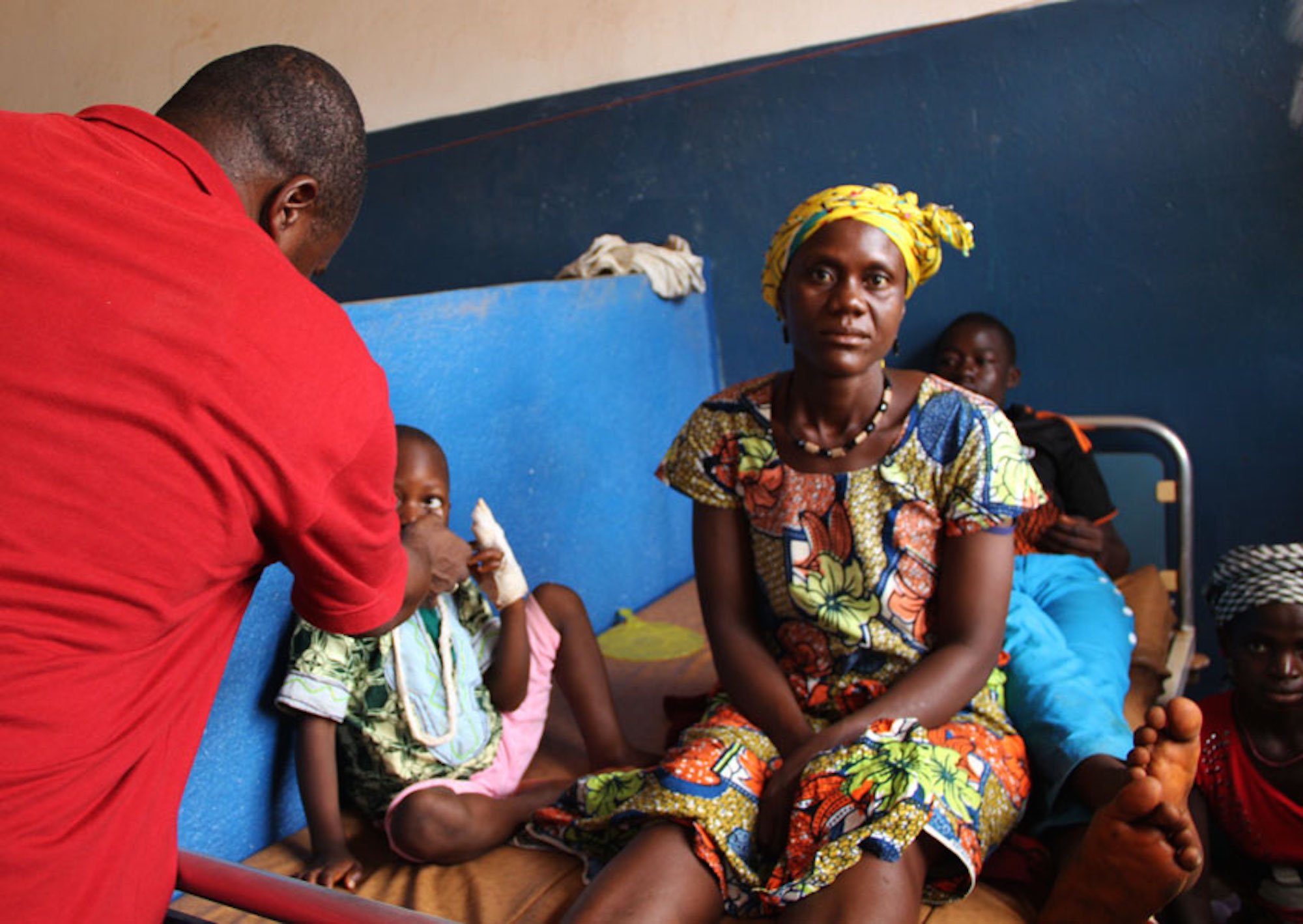“Before, the service was empty,” Doctor N’Fansoumane Kalissa, the hospital director, told IRIN. “The sick didn’t come…They saw traditional healers or were treating themselves. But people have started coming here because they know Ebola was real and that even though Ebola is no longer here [in Gueckedou], they understand [that hospitals can help] and now they come to get cured.”
Seeking out medical help from a local féticheur (which can translate as medicine man, traditional healer, witch doctor or sorcerer depending on what service they are providing) has long been a part of Guinea’s culture and customs.
Fever? Sore back? Malaria season coming up? The first stop for many families is the local healer, who they believe will either protect them or cure them, whatever the ailment. Many Guineans, particularly those in the more remote, rural areas of the country, strongly believe that if you go to a hospital before seeking help from the medicine man, it is almost certain you will die.
“Traditional healers are the best as their medicines are not manmade,” 76-year-old Isiaga Keita, a retired soldier now living in Guinea’s capital Conakry, told IRIN. “Our forefathers have been using traditional medicines for generations and they died strong with nearly all their organs in place. But today, with modern medicine, the impact is deadly on those using them.”
This used to be the prevailing logic. But then Ebola came along and things changed.
Changing mindsets
“Before, the féticheur used to be called upon to protect a village,” said Isaac Lilano, who runs an orphanage in Gueckedou.
“They would leave behind a gris-gris [talisman] and everything would be okay. But with Ebola, the death continued. So now people are divided over whether or not to call a féticheur when there is a problem,” he said, explaining that many traditional healers and medicine men died from Ebola.
“This means Ebola is stronger than the féticheurs,” Lilano continued. “So now there are many people who have lost faith in their powers.”
Traditional healers had been given the credit, in most cases, for saving people. But with Ebola, they couldn’t save anyone.
Rising suspicions and loss of confidence coincided with intense education and mobilisation campaigns by health workers and aid agencies to get people to seek treatment at health clinics and Ebola treatment centres.
At first there was a lot of resistance. Guineans refused to accept that the very medicine they had trusted and relied on for so long, could not save them. They were especially suspicious of the foreign health workers who had come to help them.
“Doctors came here and told us that Ebola is a sickness that is spread through touch and that there is no cure,” Farah Robert Tenguinano, a 25-year-old carpenter, told IRIN. “They told us, to protect ourselves we must wash our hands. We must call a doctor if someone gets sick. But we didn’t believe them. Then Ebola attacked us and killed our family.”
As the death toll continued to rise, Tenguinano, like many people here, began to see that many of those who went for help at an Ebola treatment unit early enough came out alive. Those who didn’t go, almost always died. Those who touched the sick got sick themselves. Those who stayed away from the ill, remained healthy.
“People started to realise that when they had [Ebola-like symptoms] and went to a medicine man, they died,” Lilano said. “When they went to the hospital, they were cured.”
Fode Bangoura, a trader in Coyah, a town about 40 kilometers outside of Conakry that has been hard hit by Ebola and was also a hotspot of community resistance, said his refusal to take his mother to a treatment centre when she contracted Ebola, cost her her life.
“My other family members who were taken to a treatment centre here all got treated and have since returned home,” he told IRIN. “Now, I report to the hospital straight away with any unusual health matters.”
Health officials say the fact more people are now seeking treatment at the hospitals before going to a medicine man is an encouraging sign.
“We just keep educating households that doctors are here to help,” said Doctor S. Toure, who coordinates Ebola response activities in Conakry’s Matam health district. “This has strongly decreased their apprehensions. So we will continue to talk with them until the epidemic is over, and even after that, encouraging them to seek help from the clinics for any sickness.”
Old habits die hard
But, while many Guineans say they have learned to put more trust in health workers and health clinics, many are not ready to give up on traditional medicine just yet.
Alpha Diallo, a driver in Conakry, for example, told IRIN he still doesn’t trust doctors.
“They can hardly distinguish between malaria and Ebola,” he said. “Doctors are just always doing guesswork, while traditional healers are more precise in their work. Their medicines do cure.”
Ismail Conte, a local chief in Coyah, said he has come to believe that maybe hospitals can cure certain sicknesses in certain situations.
“I thought Ebola was a lie,” he said. “But now, with explanations from doctors, I see that going to the hospital is the best solution if you have Ebola.”
For other illnesses, however, he remains unconvinced.
jl/ag





